03.13.2006, Leaders of Lebanon’s rival factions resumed talks Monday after a weeklong break in an attempt to agree on the biggest issues that divide the country – the fate of the pro-Syrian president and the U.N. call for Hezbollah’s disarmament.
Troops, armed police and concrete barriers cordoned off the parliament building Monday as the 14 faction leaders – Muslim and Christian, pro- and anti-Syrian – arrived for the talks. Druse leader Walid Jumblatt came in an inconspicuous car – a small, old Renault – for the sake of security. His bodyguards followed in a similar vehicle. "We must use all our potential to prevent the dialogue from collapsing," Parliament Speaker Nabil Berri was quoted as saying. "The conference provides a precious opportunity for national salvation," Berri said in Monday’s edition of As-Safir newspaper. The conference began on March 2 but adjourned five days later amid sharp differences over what to do about President Emile Lahoud and Hezbollah’s weapons. In announcing the adjournment, Berri said the participants needed time to consult.To view more pictures pls click READ MORE
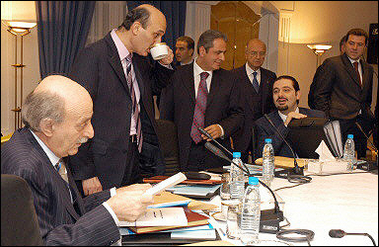 Saad Hariri (2nd R), the son of Lebanon‘s slain ex-premier Rafiq Hariri and head of the parliamentary majority, speaks to Druze leader Walid Jumblatt (L) in Beirut. Political talks in Lebanon aimed at resolving internal divisions resumed, three days ahead of the release of a new UN report into last year’s assassination of Hariri.(AFP/Hassan Ibrahim)
Saad Hariri (2nd R), the son of Lebanon‘s slain ex-premier Rafiq Hariri and head of the parliamentary majority, speaks to Druze leader Walid Jumblatt (L) in Beirut. Political talks in Lebanon aimed at resolving internal divisions resumed, three days ahead of the release of a new UN report into last year’s assassination of Hariri.(AFP/Hassan Ibrahim)
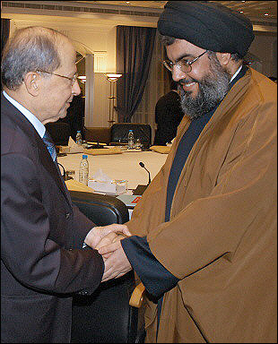 The secretary general of the Shiite Muslim Hezbollah movement, Sheikh Hassan Nasrallah (R), shakes hands with Christian leader, former general Michel Aoun, at the Lebanese parliament in Beirut. Political talks in Lebanon aimed at resolving internal divisions resumed, three days ahead of the release of a new UN report into last year’s assassination of ex-premier Rafiq Hariri.(AFP/Hassan Ibrahim)
The secretary general of the Shiite Muslim Hezbollah movement, Sheikh Hassan Nasrallah (R), shakes hands with Christian leader, former general Michel Aoun, at the Lebanese parliament in Beirut. Political talks in Lebanon aimed at resolving internal divisions resumed, three days ahead of the release of a new UN report into last year’s assassination of ex-premier Rafiq Hariri.(AFP/Hassan Ibrahim)
 Hezbollah leader Sheik Hassan Nasrallah, right, shakes hands with Lebanese politician Michel Aoun, left, ahead of the inter-Lebanese national dialogue at the parliament building, in downtown Beirut, Lebanon, Monday, March 13, 2006. Leaders of Lebanon‘s rival factions resumed talks Monday after a weeklong break in an attempt to agree on the biggest issues that divide the country _ the fate of the pro-Syrian president and the U.N. call for Hezbollah’s disarmament. (AP Photo/Hassan Ibrahim, Pool)
Hezbollah leader Sheik Hassan Nasrallah, right, shakes hands with Lebanese politician Michel Aoun, left, ahead of the inter-Lebanese national dialogue at the parliament building, in downtown Beirut, Lebanon, Monday, March 13, 2006. Leaders of Lebanon‘s rival factions resumed talks Monday after a weeklong break in an attempt to agree on the biggest issues that divide the country _ the fate of the pro-Syrian president and the U.N. call for Hezbollah’s disarmament. (AP Photo/Hassan Ibrahim, Pool)
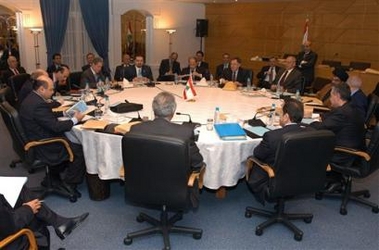 Lebanese rival factions’ leaders sit around a table, with their aids and representatives behind them ahead of the inter-Lebanese national dialogue, at the parliament building, in downtown Beirut, Lebanon, Monday, March 13, 2006. Leaders of Lebanon‘s rival factions resumed talks Monday after a weeklong break in an attempt to agree on the biggest issues that divide the country _ the fate of the pro-Syrian president and the U.N. call for Hezbollah’s disarmament. (AP Photo/Hassan Ibrahim, Pool)
Lebanese rival factions’ leaders sit around a table, with their aids and representatives behind them ahead of the inter-Lebanese national dialogue, at the parliament building, in downtown Beirut, Lebanon, Monday, March 13, 2006. Leaders of Lebanon‘s rival factions resumed talks Monday after a weeklong break in an attempt to agree on the biggest issues that divide the country _ the fate of the pro-Syrian president and the U.N. call for Hezbollah’s disarmament. (AP Photo/Hassan Ibrahim, Pool)
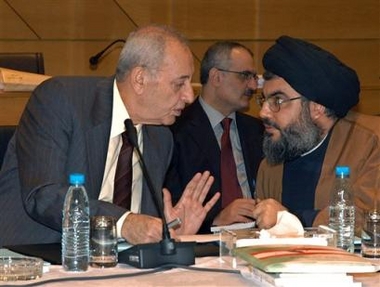 Lebanon‘s Parliament Speaker Nabih Berri, left, talks to Hezbollah leader Sheik Hassan Nasrallah, right, ahead of the inter-Lebanese national dialogue, at the parliament building, in downtown Beirut, Lebanon, Monday, March 13, 2006. Leaders of Lebanon‘s rival factions resumed talks Monday after a weeklong break in an attempt to agree on the biggest issues that divide the country _ the fate of the pro-Syrian president and the U.N. call for Hezbollah’s disarmament. (AP Photo/Hassan Ibrahim, Pool)
Lebanon‘s Parliament Speaker Nabih Berri, left, talks to Hezbollah leader Sheik Hassan Nasrallah, right, ahead of the inter-Lebanese national dialogue, at the parliament building, in downtown Beirut, Lebanon, Monday, March 13, 2006. Leaders of Lebanon‘s rival factions resumed talks Monday after a weeklong break in an attempt to agree on the biggest issues that divide the country _ the fate of the pro-Syrian president and the U.N. call for Hezbollah’s disarmament. (AP Photo/Hassan Ibrahim, Pool)
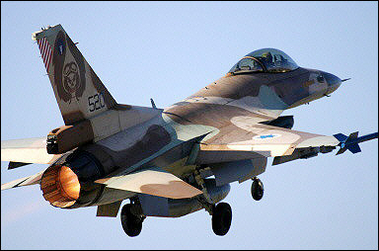 An Israeli F-16 fighter takes off from an air base in northern Israel, in April 2005. Israeli warplanes violated Lebanon‘s airspace, police said, a day after Israel announced a maximum alert along the border amid fears of an attack by the Shiite fundamentalist militia Hezbollah.(AFP/IDF/File)
An Israeli F-16 fighter takes off from an air base in northern Israel, in April 2005. Israeli warplanes violated Lebanon‘s airspace, police said, a day after Israel announced a maximum alert along the border amid fears of an attack by the Shiite fundamentalist militia Hezbollah.(AFP/IDF/File)
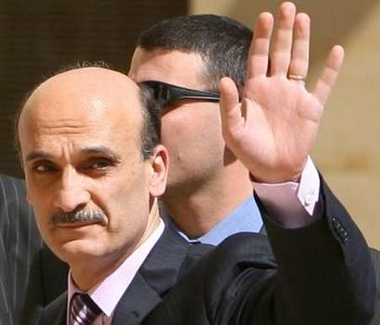 Lebanese leader Samir Geagea waves as he arrives for a meeting in parliament in downtown Beirut, Lebanon March 13, 2006. Rival politicians resumed on Monday talks aimed at ending Lebanon‘s political crisis,with leaders warning failure to resolve contentious issues would damaged an ailing economy and worsen divisions. REUTERS/Jamal Saidi
Lebanese leader Samir Geagea waves as he arrives for a meeting in parliament in downtown Beirut, Lebanon March 13, 2006. Rival politicians resumed on Monday talks aimed at ending Lebanon‘s political crisis,with leaders warning failure to resolve contentious issues would damaged an ailing economy and worsen divisions. REUTERS/Jamal Saidi
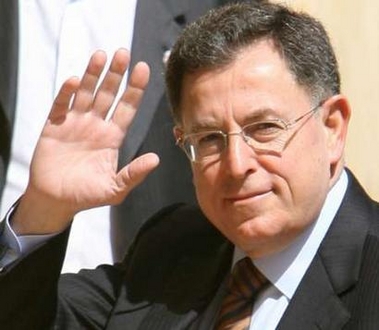 Lebanese Prime Ministes Fouad Siniora waves as he arrives for a meeting in parliament in downtown Beirut, Lebanon March 13, 2006. Rival politicians resumed on Monday talks aimed at ending Lebanon‘s political crisis,with leaders warning failure to resolve contentious issues would damaged an ailing economy and worsen divisions. REUTERS/Jamal Saidi
Lebanese Prime Ministes Fouad Siniora waves as he arrives for a meeting in parliament in downtown Beirut, Lebanon March 13, 2006. Rival politicians resumed on Monday talks aimed at ending Lebanon‘s political crisis,with leaders warning failure to resolve contentious issues would damaged an ailing economy and worsen divisions. REUTERS/Jamal Saidi
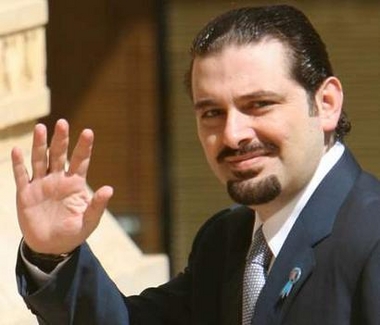 Lebanese parliament majority leader Saad al-Hariri waves as he arrives for a meeting in parliament in downtown Beirut, Lebanon March 13, 2006. Rival politicians resumed on Monday talks aimed at ending Lebanon‘s political crisis,with leaders warning failure to resolve contentious issues would damaged an ailing economy and worsen divisions. REUTERS/Jamal Saidi
Lebanese parliament majority leader Saad al-Hariri waves as he arrives for a meeting in parliament in downtown Beirut, Lebanon March 13, 2006. Rival politicians resumed on Monday talks aimed at ending Lebanon‘s political crisis,with leaders warning failure to resolve contentious issues would damaged an ailing economy and worsen divisions. REUTERS/Jamal Saidi
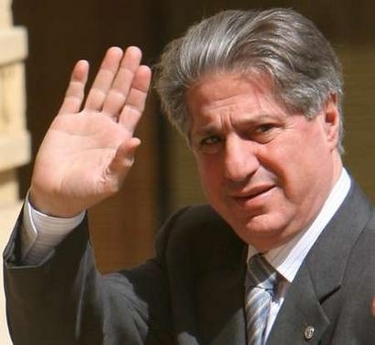 Lebanese former president Amin Gemayel waves as he arrives for a meeting in parliament in downtown Beirut, Lebanon March 13, 2006. Rival politicians resumed on Monday talks aimed at ending Lebanon‘s political crisis,with leaders warning failure to resolve contentious issues would damaged an ailing economy and worsen divisions. REUTERS/Jamal Saidi
Lebanese former president Amin Gemayel waves as he arrives for a meeting in parliament in downtown Beirut, Lebanon March 13, 2006. Rival politicians resumed on Monday talks aimed at ending Lebanon‘s political crisis,with leaders warning failure to resolve contentious issues would damaged an ailing economy and worsen divisions. REUTERS/Jamal Saidi
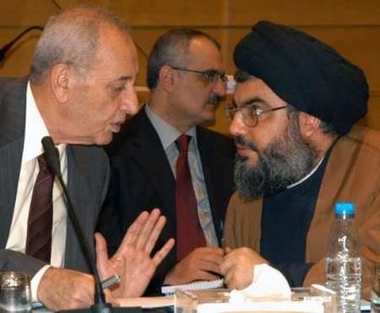 Lebanon‘s Basile Shaaban races during a practice session of the A1 Grand Prix of Nations auto race in Monterey, Calif., Saturday, March 11, 2006. (AP Photo/Marcio Jose Sanchez)
Lebanon‘s Basile Shaaban races during a practice session of the A1 Grand Prix of Nations auto race in Monterey, Calif., Saturday, March 11, 2006. (AP Photo/Marcio Jose Sanchez)
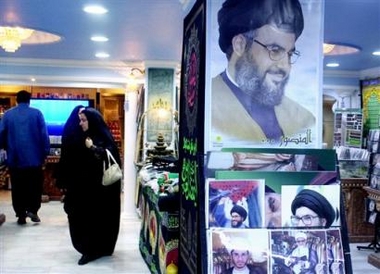 Bahraini Shiites walk around a store selling Shiite religious posters, books, and other materials Tuesday March 7, 2006, in Manama, Bahrain. The posters from top show Hezbollah leader Sheik Hassan Nasrallah of Lebanon, late Iranian Supreme Leader Ayatollah Rohollah Khomeini in between two smaller pictures of Nasrallah beneath it. Also shown are Sheik Ali Salman, left, and Sheik Abdel Amir al-Jamri, at right, both Shiite leaders in Bahrain. Shiites in Bahrain and elsewhere in the region are pleased to see Shiites finally in power in Iraq , but fear the sectarian strife there will spill over. (AP Photo/ Hasan Jamali)
Bahraini Shiites walk around a store selling Shiite religious posters, books, and other materials Tuesday March 7, 2006, in Manama, Bahrain. The posters from top show Hezbollah leader Sheik Hassan Nasrallah of Lebanon, late Iranian Supreme Leader Ayatollah Rohollah Khomeini in between two smaller pictures of Nasrallah beneath it. Also shown are Sheik Ali Salman, left, and Sheik Abdel Amir al-Jamri, at right, both Shiite leaders in Bahrain. Shiites in Bahrain and elsewhere in the region are pleased to see Shiites finally in power in Iraq , but fear the sectarian strife there will spill over. (AP Photo/ Hasan Jamali)
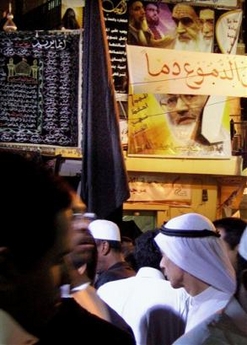 Bahraini Shiite men gather in the streets of Manama, Bahrain, Feb. 8, 2006, beneath black flags and pictures of Shiite leaders from around the region during Ashura, a Shiite time of mourning over the killing of Hussein, the nephew of Islam’s founding prophet. At top from left to right are the late Baqer al-Hakim of Iraq , Hezbollah leader in Lebanon Hassan Nasrallah; late Iranian Supreme Leader Ayatollah Ruhollah Khomeini; current Iranian Supreme Leader Ayatollah Ali Khamenei; and, beneath them, Sheik Isa Qassim of Bahrain. Shiites in Bahrain and elsewhere in the region are pleased to see Shiites finally in power in Iraq, but fear the sectarian strife there will spill over. (AP Photo/ Hasan Jamali)
Bahraini Shiite men gather in the streets of Manama, Bahrain, Feb. 8, 2006, beneath black flags and pictures of Shiite leaders from around the region during Ashura, a Shiite time of mourning over the killing of Hussein, the nephew of Islam’s founding prophet. At top from left to right are the late Baqer al-Hakim of Iraq , Hezbollah leader in Lebanon Hassan Nasrallah; late Iranian Supreme Leader Ayatollah Ruhollah Khomeini; current Iranian Supreme Leader Ayatollah Ali Khamenei; and, beneath them, Sheik Isa Qassim of Bahrain. Shiites in Bahrain and elsewhere in the region are pleased to see Shiites finally in power in Iraq, but fear the sectarian strife there will spill over. (AP Photo/ Hasan Jamali)
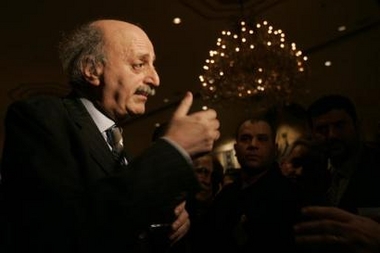 Walid Jumblatt, Lebanese leader and member of the Democratic Meeting Bloc in the Lebanese Parliament speaks with members of Lebanon Society, a group of Lebanese and Lebanese American in New York Thursday, March 9, 2006. (AP Photo/Shiho Fukada).
Walid Jumblatt, Lebanese leader and member of the Democratic Meeting Bloc in the Lebanese Parliament speaks with members of Lebanon Society, a group of Lebanese and Lebanese American in New York Thursday, March 9, 2006. (AP Photo/Shiho Fukada).
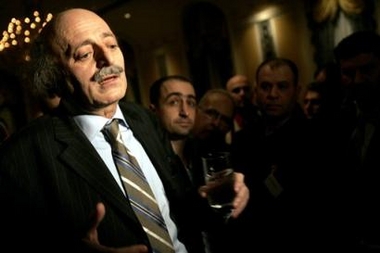 Lebanese political leader Walid Jumblatt speaks with members of Lebanon Society, a group of Lebanese and Lebanese-Americans in New York Thursday, March 9, 2006. Jumblatt said Thursday he will consult his domestic political allies on holding free presidential elections soon to replace Lebanon‘s pro-Syrian president who he claimed is unconstitutionally holding the job. (AP Photo/Shiho Fukada)
Lebanese political leader Walid Jumblatt speaks with members of Lebanon Society, a group of Lebanese and Lebanese-Americans in New York Thursday, March 9, 2006. Jumblatt said Thursday he will consult his domestic political allies on holding free presidential elections soon to replace Lebanon‘s pro-Syrian president who he claimed is unconstitutionally holding the job. (AP Photo/Shiho Fukada)

Last week Berri acknowledged the difficulties but said the talks were helping to overcome some of the divisions that threaten Lebanon, a country that suffered a sectarian civil war between 1975 and 1990. The factions have agreed on the handling of the investigation into the assassination of former Prime Minister Rafik Hariri and an international tribunal for those charged with the murder.
The conference has focused on a U.N. Security Council resolution of September 2004 that called for presidential elections in Lebanon and the disarmament of Hezbollah and the Palestinian guerrillas in Lebanon.
At the time it was passed, the pro-Syrian majority in the Lebanese parliament ignored the resolution and voted to extend Lahoud’s term for three years.
But legislative elections last year – called after the withdrawal of Syrian troops – produced a parliamentary majority that opposes Syrian influence in Lebanon.
The anti-Syrian factions have launched a campaign for Lahoud to step down. However, the president has refused and has vowed to remain until his mandate expires in 2007.
Some anti-Syrian politicians are pressing for Hezbollah’s disarmament. But the militant group, which is backed by Syria and Iran, refuses to give up its weapons.
The United Nations this week is expected to receive the first report of its new investigator into Hariri’s assassination.
The U.N. Security Council has twice accused Syria of failing to cooperate fully with the U.N. investigation, which has implicated Syrian intelligence in the truck bombing that killed Hariri and 20 others in central Beirut on Feb. 14, 2005.
Walid Moallem, the foreign minister of Syria, which has denied involvement in Hariri’s murder, is in Moscow for talks that will cover the U.N. resolutions calling on Syria to cooperate fully with the Hariri probe.
Russian Foreign Minister Sergey Lavrov was reported as saying Monday he would back the U.N. call in his talks with Moallem but that his government saw no reason for sanctions against Damascus.



